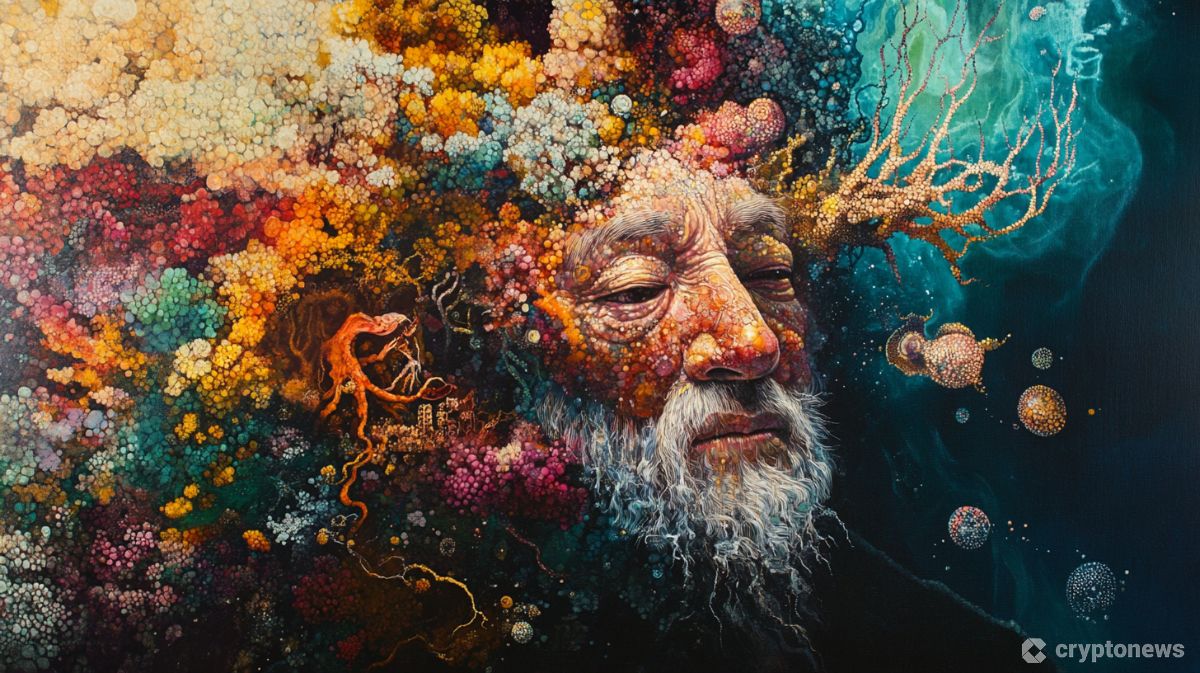Last updated:
 Why Trust Cryptonews
Why Trust Cryptonews

A wave of Web3 companies are now jumping into the longevity space by developing platforms and creating apps that seek to put health data back in users’ hands.
These crypto-powered protocols don’t just promise longer lives—they’re reshaping how we fund 9, track health metrics and access anti-aging options that are normally reserved for the wealthy.
Recent statistics show that the global longevity and anti-senescence therapy market was valued at $25.1 billion in 2020.
This is projected to reach $44.2 billion by 2030, growing at a compound annual growth rate (CAGR) of 6.1% from 2021 to 2030.
Source: AlliedMarketResearch
Benji Leibowitz, co-founder of crypto-powered research protocol Pump.science, told Cryptonews that longevity is especially appealing to the Web3 community because people within the industry tend to be obsessed with optimization.
Swan Sit, public board director and Web3 advisor, further told Cryptonews that the crypto industry is younger on average, and millennials/Gen Z’s were raised with the belief that they could change the world.
“So starting a business as a teenager or changing their health outcome isn’t too far a stretch,” Sit said. “These generations are also more health conscious than their parents, armed with scientific proof that working out is crucial – not just for vanity – but for overall wellness, and what we eat or how we sleep decisively correlates to performance and even how we feel.”
Sit added that all of these elements can be controlled, which is empowering. Moreover, Leibowitz remarked that Web3’s core belief in self-sovereignty is another reason for the interest in longevity.
“We want control over finances, data, and most importantly, our health. Longevity is a natural extension of that mindset,” he said.
A Decentralized Longevity Protocol
Leibowitz also believes that decentralized health data can enable longevity.Pump.science ensures this by allowing anyone to launch and fund research into potentially life-extending compounds.
“Users can propose an intervention (like a supplement or molecule), tokenize it, and raise funds through trading. Those fees directly fund high-throughput experiments, first in worms, then flies, mice, and eventually humans,” Leibowitz stated.
Science-driven products are produced as a result, with data being transparent, community-driven and accessible.
With most longevity solutions being unaffordable, Pump.science aims to bring new solutions to the masses.
For example, Leibowitz shared that Pump.science recently released its first longevity supplement called “Urolithin A.”
The compound is believed to increase mitophagy, which is the body’s clean-up and replacement system for the mitochondria that power human cells.
“Every supplement on our platform has to prove itself in live experiments: first in worms, then flies, then mice, and eventually humans,” Leibowitz said. “Urolithin A passed the first two stages with flying colors, showing a 6.35% lifespan boost in worms and over 20% in flies.”
Source: Pump.science
Human trials are expected to take place next for the supplement. Leibowitz pointed out that the Pump.science community is being invited to participate.
“This is the full vision coming to life: crypto funding science, science powering real products, and products feeding back into better health and better research,” he said.
Accessible Health Data to Live Beyond 140 Years
Making longevity transparent and accessible is also the goal behind CUDIS, a Web3-based longevity protocol focused on wearable technology.
CUDIS is well-known for its artificial intelligence (AI) powered smart ring, but most recently the company launched a Longevity Hub.
This is a decentralized ecosystem that connects users, researchers, and longevity-focused projects.
Edison Chen, co-founder and CEO of CUDIS, told Cryptonews that the Web3 community has always been about empowerment, transparency, and breaking down centralized control.
He noted this perspective differs from traditional legacy systems, where health data is monetized by big corporations.
“With CUDIS and Web3, we flip that dynamic,” Chen said. “In this new longevity community, longevity isn’t just a health mission, it’s a movement for sovereignty, where your data, your health, and the benefits that come from them truly belong to you.”
Chen added that a current challenge facing longevity is the cost. “It feels like it’s for the elite, or for people who can drop $250K a year on anti-aging clinics. Most people don’t even know where to start, or whether their efforts are working.”
Chen explained that CUDIS’s Longevity Hub will provide users with accessible data to make longevity measurable and affordable.
The platform does this by leveraging blockchain to put users in control of their health data.
“The Hub allows individuals to securely manage, share, or keep their data private, removing corporate control and ensuring true data sovereignty over personal health insights,” Chen remarked.
He added that decentralizing health data ownership empowers users to take control over personal information.
“Through the integration of wearable devices, an AI-powered Longevity Hub, and a blockchain-driven Super App, users gain full ownership of their health data, real-time longevity insights, exclusive access to curated longevity products, programs and services, and economic incentives for optimizing their biological health,” Chen stated.
Core functionalities of the CUDIS Longevity Hub include a wallet that allows users to participate in the CUDIS ecosystem, along with access to on-chain data and rewards for completing health goals.
An AI agent coach is also available to help users analyze health data in real time.
Chen added that CUDIS seeks to prolong healthspan to 140 years, which he believes will be possible by optimizing longevity in an affordable manner.
Fitness App Built on Solana
While longevity protocols look to expand user lifespan, a gamified Web3 application helps users stay fit.
Caitlin Cook, director of growth at Moonwalk Fitness, told Crytonews that Moonwalk is a fitness accountability app built on Solana.
Moonwalk combines financial incentives with daily step goals to gamify healthy habit formation.
For example, Moonwalk lets users participate in step-based challenges. Cook explained that users first commit to hitting a daily step goal over a set period of time.
To join the game, players must pledge an entry fee. Moonwalk uses tokens on Solana, including Circle’s USDC stablecoin, SOL, and BONK.
“Players tap into loss aversion as a powerful motivator to follow through,” Cook said. “Those who meet their goals each day get their full deposit back at the end of the game and become eligible to split a prize pool, which is made up of partial deposits forfeited from players who missed the daily goal.”
According to Cook, this model creates a meaningful financial incentive to stay consistent.
She added that the Moonwalk experience is exemplified through its social dynamic. “You’re competing to achieve goals alongside others in real time, turning fitness into a shared journey that’s more fun, motivating, and accountable.”
With the desire for longevity increasing, Cook shared that Moonwalk plans to expand beyond its single step contest format.
“New game modes and broader support for a wider range of health and activity data are on our (very long) roadmap. Ultimately, Moonwalk will be the go-to app for anyone looking to gamify their fitness journey and track the metrics that matter most,” she said.
Challenges Facing Web3 Longevity Protocols
While Web3 longevity protocols may be more affordable and equally effective as mainstream platforms, a number of challenges could hamper adoption.
For instance, Cook believes that one of the biggest challenges is reducing crypto-related friction.
“Most people don’t want to set up a wallet or buy tokens just to try a fitness app. If that’s the barrier, you lose most non-crypto-native users before they even get started,” she remarked.
In order to combat this, Cook pointed out that Solana runs quietly in the background, while Moonwalk focuses on making the user experience seamless, fun, and accessible.
For instance, Moonwalk is discoverable in the App Store and Google Play.
There is also a free-to-play option that removes financial friction for users who want to try the app without commitment. Moreover, fiat support for buying game credits will soon be integrated.
“At the end of the day, blockchain should be the engine for consumer apps – not the pitch,” Cook stated.
Leibowitz noted that trust remains a barrier, however.
“People want to know they can trust science and that experiments are being done safely and transparently, not just for hype or speculation,” he said
Pump.science seeks to address this by partnering with real scientists and well-known laboratories. All results are also made publicly available and data is placed on-chain.
“Education is key. We want to make the science approachable so people understand the real value behind what we’re testing,” Leibowitz said.





